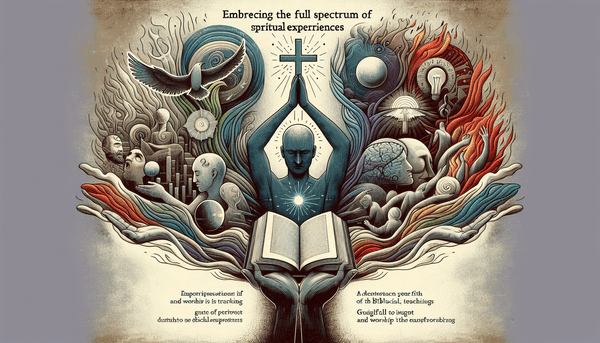Starting Your Journey with the Bible
For those new to the Bible or looking to rekindle their connection with its teachings, the Book of John stands as an inviting gateway. John's narrative offers not merely an account of events but a profound introduction to the central figure of the Christian faith, Jesus Christ, and His message of love and salvation. Key themes to absorb include the divinity of Jesus, the nature of His ministry, and the depth of His compassion. As John 1:1 states, 'In the beginning was the Word, and the Word was with God, and the Word was God,' setting the stage for a gospel that intertwines the human and divine in the person of Jesus. His declaration in John 14:6, 'I am the way and the truth and the life. No one comes to the Father except through me,' invites believers to a personal and transformative relationship with God.
Cultivating Joy and Peace as Fruits of the Spirit
As believers walk the path of faith, the cultivation of spiritual fruits such as joy and peace becomes a testament to their growing relationship with God. Prayer and meditation on God's Word serve as nourishing practices, anchoring the soul to divine truth. Philippians 4:6-7 encourages a life unburdened by anxiety, through prayer and thanksgiving, promising that 'the peace of God, which transcends all understanding, will guard your hearts and your minds in Christ Jesus.' The Christian fellowship, as highlighted in Romans 15:13, fosters a supportive community that 'fills you with all joy and peace as you trust in Him.' Furthermore, embodying gratitude and service, as 1 Thessalonians 5:16-18 suggests, 'Rejoice always, pray continually, give thanks in all circumstances,' can transform everyday interactions and instill a sense of enduring serenity within one's spirit.
Seeking Wisdom and Dealing with Life's Challenges
In the ebb and flow of life's challenges, the Bible remains a steadfast source of wisdom and comfort. It encourages believers to lean not on their own understanding but to trust in the Lord's unerring guidance, as stated in Proverbs 3:5-6. In times of uncertainty and decision-making, seeking divine wisdom is paramount, as James 1:5 assures us that God gives generously to all without finding fault. The act of prayer becomes a refuge, a place to lay down one's burdens, as reflected in Matthew 11:28, where Jesus invites the weary to find rest in Him. By embracing this divine wisdom and casting anxieties upon God, as 1 Peter 5:7 suggests, believers can navigate life's tumultuous waters with an anchored spirit.
Free Will and God's Sovereignty
The interplay between human free will and divine sovereignty is a complex and often debated aspect of theology. The Bible presents a nuanced view that honors human agency while affirming God's overarching plan. In Genesis 1:26, humanity is created in God's image, endowed with the capacity to make choices and exert dominion. Deuteronomy 30:19 further emphasizes the responsibility to choose life, blessing, or curse. Joshua 24:15 echoes this sentiment, urging people to choose whom they will serve. Yet, within this framework of choice, Proverbs 16:9 acknowledges that 'In their hearts humans plan their course, but the Lord establishes their steps,' implying that God's sovereignty weaves through the fabric of free will, guiding and shaping the ultimate outcome in conformity with His purposes, as Ephesians 1:11 affirms.
Conclusion
Our journey through these Bible topics reveals the text's enduring power to guide, inspire, and transform. Through the lens of the Book of John, the cultivation of spiritual fruits, and the wisdom found in scripture, we gain not only knowledge but also a deeper connection to our faith. The Bible's narratives and teachings encourage us to pursue a life that reflects the character of Christ and to seek solace in the divine presence during times of trial. As we consider these insights and apply them to our lives, may we continue to grow in grace and truth, carrying with us the light of the Word into every aspect of our existence.
FAQ
Q: Where can I start in my Bible?
A: You can start with the Book of John in the New Testament, which provides a profound introduction to the life and teachings of Jesus Christ.
Q: Can you provide examples of significant events or miracles from the book of John?
A: Yes, one significant event is Jesus turning water into wine at a wedding in Cana (John 2:1-11), which was His first miracle.
Q: How can believers cultivate joy and peace as fruits of the Spirit in their lives?
A: Believers can cultivate joy and peace through prayer, meditation on the Word of God, participating in Christian fellowship, and living a life of gratitude and service.
Q: What are the fruits of the Spirit?
A: The fruits of the Spirit are described in Galatians 5:22-23 and include love, joy, peace, forbearance, kindness, goodness, faithfulness, gentleness, and self-control.






